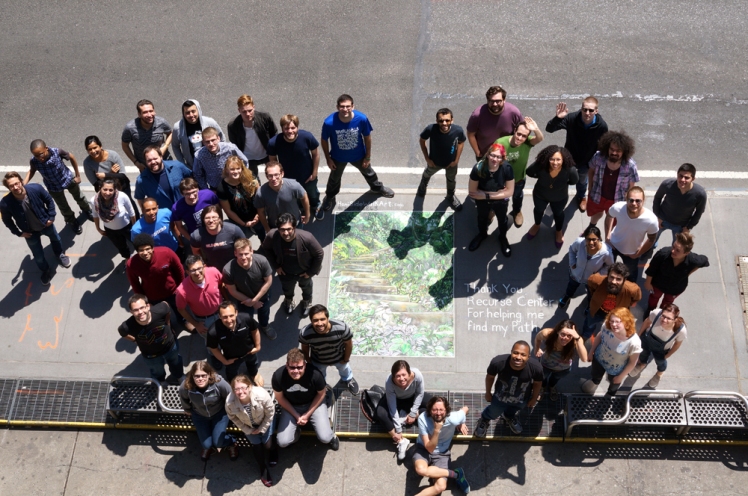Disclaimer:
This post is to document my interview experience at Recurse Center (formerly known as Hacker School) for the benefit of other candidates. Please be aware that a lot might have changed in their process (since I applied at least 5 years back as of this writing). All content produced in this post is purely based on the author’s experience.

The Recurse Center (RC) application process involves the following stages:
- Online application – Link
- Interview 1 (over skype) – non technical
- Interview 2 (over skype) – technical: pair programming
- Online application
Before filling out the application, it is good to read the RC website throughly, to understand their learning culture and what they expect from a participant. Read the About, FAQ, Manual and Blog.
In addition, read blog posts of former RC participants.
- http://www.davidpeter.me/stories/hacker-school
- http://nerdneha.tumblr.com/post/48064403230/try-try-again-a-lesson-in-persistence
- http://nerdneha.tumblr.com/post/76187583574/how-did-you-teach-yourself-programming
- https://medium.com/hacker-school/how-to-get-the-most-out-of-hacker-school-ab08782397f8
- http://sahatyalkabov.com/hacker-school-week-1/
- http://archive.wired.com/geekmom/2012/12/hacker-school-experience/
This will help you frame your subjective answers in the application. It is good to speak about the contributions you have made, any social impact you have created (maybe by conducting workshops/giving talks/organizing coding competitions).
Also, present any leadership skills you may have portrayed in any technical event you helped organizing.
The application has 2 programming questions.
The first is CracklePop, which should be very easy to code.
The second is to write a code from scratch. It need not be very complicated and should not involve any frameworks.
Tip: Be innovative and use your creativity. It could be a small hack that you did to make your life easy. It should be something you wrote on your own.
E.g.: A script that would automatically submit your weekly assignments to the class portal, so that you no longer miss any deadline.
RC accepts participants who have 3 months to more than 20 years of experience. So, your programming experience should not be a concern.
Write and rewrite your application and get it reviewed by your mentors/peers.
- Interview 1 (over skype) – non technical
Once you submit your application, you would be intimated by mail if you are selected for the next round.
You would be given a number interview slots to choose from. The interviewer name, date and time of the interview would be given.
Tip: Before selecting a slot, read about the interviewer. Their interests, projects and so on. Google their blog / twitter account to get this information.
You are at an advantage when you select an interviewer who shares same interest as you 🙂
The interview lasts for not more than 30 minutes. Be on time and make sure your internet is connected and do an audio test on skype to make sure your there is no technical lag.
You would not have to do any coding in this interview. What they look in for is whether you fit in to RC or not. Your attitude is closely observed.
Rehearse your answers for questions such as why do you want to be at RC, what do you expect from them, what is your background in programming. Elaborate your contributions and any social impact you have done. They will see how you would contribute back once you are done schooling at RC.
The interviewer would ask at the end if you have any question. It’s good to have few thought in advance 🙂
- Interview 2 (over skype) – technical: pair programming
You would be notified over mail if you have cleared the first interview.
You would again be given a number of interview slot options to choose from. Repeat the above tip to choose your interviewer wisely.
You will have to pair program with the interviewer on your code, with the interview lasting for a maximum of 30 minutes.
Before your interview, you would have to write a program from scratch, again without using any framework. It should be a code written by you.
The interviewer would not code anything, but would give you hints and directions along while you code.
- In the first few minutes, you will need to explain what your program is all about and what you are going to implement.
- Thus, study your code thoroughly before the interview. Test that it runs as expected. Have a clear idea of what you are going to implement. You can also depict what you are going to implement in a diagram and share the link with your interviewer.
- Say what you are thinking while you code. Let the interviewer know why you are writing a piece of code.
For example, if you are finding the average score, say how you derive at it.
Like, now to find the average I must first sum all the scores and divide it by the entities.
- Ask for suggestions from the interviewer, what he/she feels about this approach. Be open to suggestions.
- Do not code long. Code short, test and continue.
- Add debugging statements.
After the interview, you would soon be notified by mail about your acceptance!

All the best! 🙂
Cheers,
Aishwarya